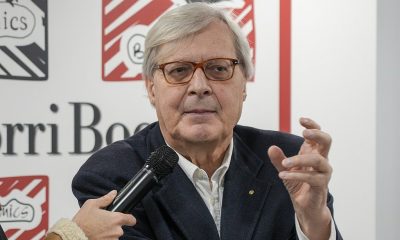ART WORLD NEWS
Fatos Üstek Out at Liverpool Biennial Amid Organizational Turmoil – ARTnews.com
Usually the departure of an internationally renowned director from a major international art festival is big news. But when Fatos Üstek left the Liverpool Biennial in October, there was no public announcement. The reasons behind the departure, which has led to the departure of board members, suggest internal strife at the 22-year-old organization prompted by the pandemic.
Despite not being in a major capital city, the Liverpool Biennial is one of the world’s most closely watched exhibitions of its kind. Its 11th edition, originally set for July 2020, was poised to be one of its most high-profile ones to date. At the beginning of 2019, the biennial brought on Üstek, a Turkish-born curator whose reputation had been growing as a result of her work on the curatorial team of the lauded 2014 Gwangju Biennale in South Korea. Üstek, who started in May of that year, would fill the position of director, which had been left vacant after the former one, Sally Tallant, left to lead the Queens Museum in New York. The biennial unveiled its artist list in November 2019, and it included a host of stars—among them Judy Chicago, Rashid Johnson, and Camille Henrot—alongside rising figures like Larry Achiampong, Ebony G. Patterson, Sonia Gomes, Pedro Neves Marques, and Ligia Lewis.
Related Articles
Anticipation was running high in advance of the opening, which had been expected for July 2020. Then the coronavirus struck, and in April, the opening date was pushed to March 2021. It was around then that the problems allegedly began.
The Liverpool Biennial is not alone in having to dramatically alter its operations in response to the pandemic. Biennials around the world, from the Venice Biennale to the Gwangju Biennale, have been forced to shift the dates of their next editions amid uncertainty about when it will be safe to hold large-scale exhibitions as planned. But few biennials have experienced internal tumult of the kind that Liverpool has over the past six months.
Üstek told ARTnews that her departure came amid disagreements over the purview of her role. In protest of her departure and the way it was handled internally, two board members at the biennial also resigned last month.
“Governance issues with a lack of clarity on roles and responsibilities, and processes not being followed, taken together made my role untenable,” Üstek said in a statement to ARTnews. “I am sad that I cannot continue to lead the amazing Biennial team in delivering the coming and future editions. Liverpool is an exciting and dynamic city and I am immensely grateful for the support of a strong network of colleagues who are making incredible advancements in the arts and culture.”
Samantha Lackey, the head of collections and exhibitions of the Whitworth museum in Manchester, is now listed as interim director on the biennial’s website. A Liverpool Biennial spokesperson said a search would be undertaken for a new director next year.
The two board members who left—Jonathan Sharples, an art and intellectual property lawyer, and Fiona Banner, an artist based in London with an international following—both confirmed only that they had departed in October and declined to comment further. They had each sat on the board for less than a year.
A Liverpool Biennial spokesperson initially declined to make high-ranking officials available for interview when requested by ARTnews and said that the biennial could not comment on a list of fact-checking queries.
After this article was initially published, a Liverpool Biennial spokesperson sent ARTnews an extended statement in which the biennial said that the board had been made aware of employees’ concerns over “her management of governance, finances and staffing.”
“Fatoş Üstek was given the opportunity to address the concerns, which she did not accept,” the biennial said in its statement. “The Liverpool Biennial Board, represented by a total of 13 Trustees, made two offers of a settlement agreement, which she declined before submitting her resignation.”
Üstek’s departure is significant, since the director position is a high-ranking one that, in the case of the Liverpool Biennial, has not had frequent turnover. At biennials such as the Venice Biennale and the Berlin Biennale, the artistic director typically oversees the main exhibition, its curatorial framework, and the surrounding proceedings, and that person works with a curatorial team on just one edition. At the Liverpool Biennial, however, the curator historically has changed with each edition, but the director has stayed the same.
The Liverpool Biennial board headhunted Üstek for the director position, a role that has only ever been held by two other people since the biennial’s founding in 1998. Üstek was thought of as someone who would shake up the festival, according to sources. A rising star in the U.K. with a reputation for pinpointing emerging talents, Üstek became the director of the David Roberts Art Foundation in London after working on the Gwangju Biennale. When her appointment to Liverpool, was announced in February 2019, board chair Kathleen Soriano praised Üstek for her “international connections” and her “rich experience.”
But relations between Üstek and the board began to sour around the time of the first lockdown, sources said. Before Üstek had been named director, Manuela Moscoso, senior curator at the Museo Tamayo in Mexico City, had already been announced as the curator of the 2020 biennial. In July, sources said, Moscoso relocated to Berlin. Later on, when Moscoso asked to remain in the German capital and stay on at the biennial, Üstek requested that she return to Liverpool. Moscoso complained about this to board chair Soriano, who authorized a renegotiation of the terms of Moscoso’s contract that would allow her to stay in Berlin.
Üstek declined to comment on the immediate factors that incited her departure. A Liverpool Biennial spokesperson denied that Moscoso had moved to Berlin. The biennial also denied that her contract had been renegotiated.
The Liverpool Biennial spokesperson sent a statement from Soriano that reads, “We are all deeply grateful for Fatos’ contributions to the Biennial. We would like to thank her for her work during these last difficult months, facing all the challenges of the Covid-19 pandemic with energy and fortitude.”
Üstek said that when she left, the biennial was about 80 percent complete. In the months leading up to her resignation, she had been working to make the event Covid-friendly, rejiggering projects to conform to newly instituted safety protocols and working with artists who wanted to make alterations to the artwork they were to exhibit. (Many of the works in the forthcoming edition are commissions.) In June, Üstek told Artnet News, “It is not easy to pull off a biennial right now.”
Update 11/24/20, 3:30pm: After this article was published, the Liverpool Biennial sent ARTnews a follow-up statement. This article has been updated to include a section of that statement, along with a clarification on the terms of Moscoso’s contract and her location. Additionally, this article misstated when the biennial was once expected to open. It was expected to open in July 2020, not October 2020.
Update 11/25/20, 12 p.m.: This article has been updated to clarify when Moscoso departed for Berlin. She left in July, not in March.











